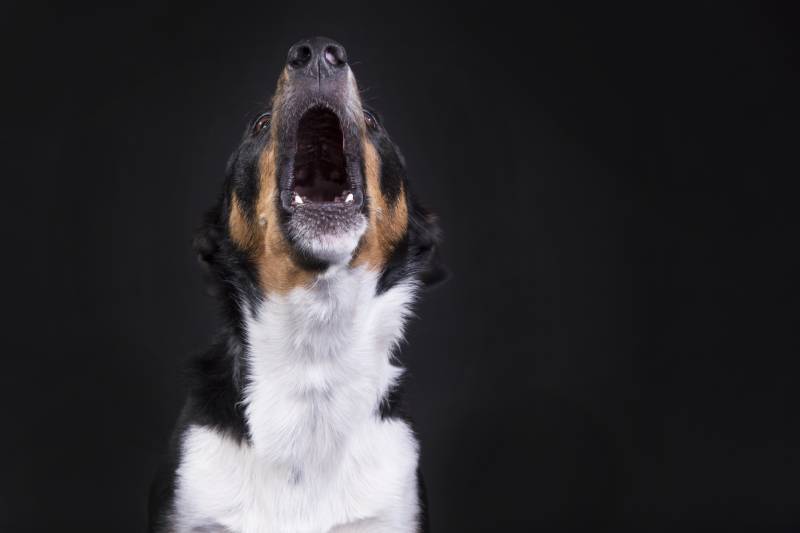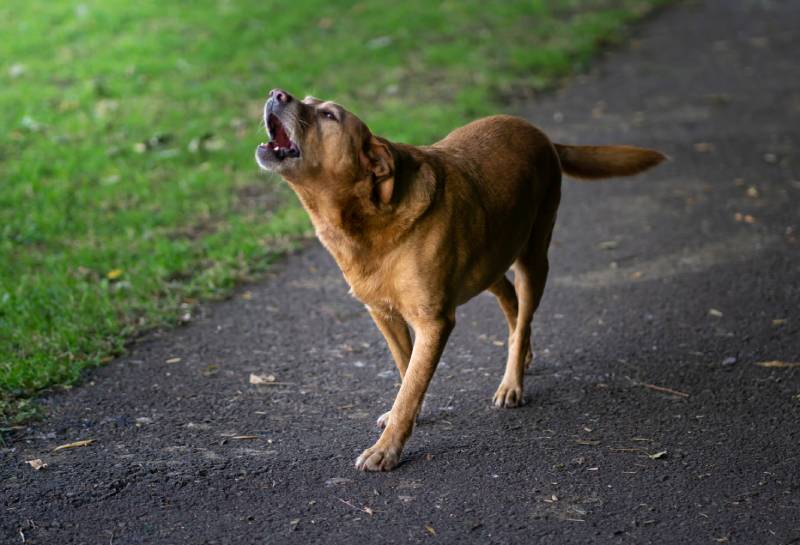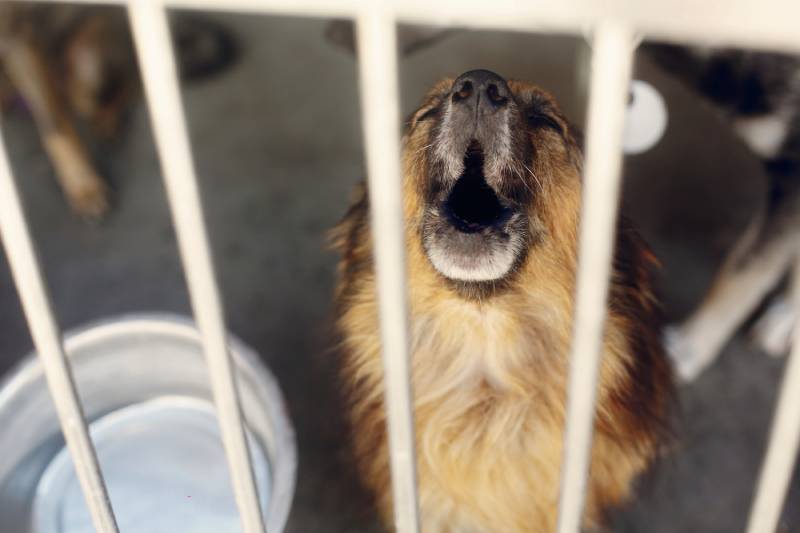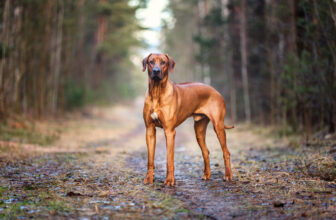
[ad_1]
There’s a classic image that appears in our minds when we think of howling: a canine silhouette howling atop a hill against the backdrop of a large full moon. There is a reason this picture became so synonymous with wolves: they are known for their long, strident howls.
But what about dogs? Dog owners know that dogs howl for various reasons, especially noisy breeds like Huskies. While some dogs are noisier than others, howling at the moon is something we might think all dogs do.
Neither dogs nor wolves howl at the moon. Dogs howl at night, and some may do it more often when the moon is brighter. Dogs and wolves communicate via howling over long distances, which is more easily heard when there’s less activity at night. While wolves do it to keep their pack together and coordinate hunts, dogs keep the instinctual urge to howl from their lupine ancestors.

Why Do Dogs Howl?
Dogs howl because of instinctual traits they inherited from their wolf ancestors. All domestic dogs (Canis lupus familiaris) are descended from wolves (Canis lupus). Some of the behaviors wolves use to survive and thrive in the wild were passed down to domestic dogs (such as howling) and are still expressed.
Wolves howl to communicate with the rest of their pack over vast distances, including for hunting and locating purposes. Wolves often howl at night when the surroundings are generally quieter, and they might find higher ground to help the sound carry further.
This led to the wolf’s silhouette on a hill against a moon! When dogs howl, it can also be for communicative reasons. However, most dogs howl for several reasons, including hearing nearby animals in the yard. While dogs can howl at night when the moon is out (and some may even do it more often), it’s not the moon that prompts them to howl.

The 7 Other Reasons Dogs Howl
Canines howl for many reasons, and some are more problematic than others. Your dog howling when the moon is out is more than likely a way of communication for them, so you need to determine what your dog is trying to say!
1. Loud Noises
If your dog loves to howl along with a fire or police siren, they may be communicating to you that they hear it! Long, high-pitched sounds stimulate dogs, including music or other dogs’ howls. Your dog is telling you that they’re alert to the action and are ready to act if needed. Thankfully, this kind of howling usually ends as the noises end!

2. Locating
Much like their wolf ancestors, dogs howl to signal where they are in relation to other dogs. This can be howling to let others know that another dog is approaching or to let another canine companion know where they are. This can also be true for dogs separated from their owners; some dogs howl to let their owners know where they are in the hope they’ll come to them.
3. Intruder Alarm
Dogs also make lots of noise when defending their territory or alerting their owners to intruders, including howling. Dogs are naturally protective of their homes and families, so howling can act as a warning deterrent to other dogs or humans.

4. Attention
Some dogs howl for attention, which is when it can become repetitive and troublesome. This behavior is often learned and unknowingly reinforced by owners. If your dog is howling for attention and you’ve established it’s not for another reason (such as pain), completely ignoring them and resisting the urge to interact is the key to remedying the behavior.
While this can be very difficult, rewarding them with attention once they’re quiet is the only way to help them learn how to ask for attention properly!
5. Pain
When dogs are in pain, they may howl or cry out. This is the same as people screaming or crying out when something hurts us; if you think your dog is howling in pain, they should never be ignored.
Taking them to the veterinarian is necessary. The Glasgow Composite Pain Scale is used in veterinary practices to quickly evaluate the level of pain a dog is in; screaming is used to denote severe pain.

6. Fear or Anxiety
Dogs that are less confident in their surroundings or away from their owners may howl when they’re feeling anxious or afraid. Separation anxiety is a big problem for some owners, and their dogs can howl continuously when they’re away. If your dog’s howling stops as soon as you come home, separation anxiety could be to blame.
7. Alerting When Working
Some dogs are trained to alert their owners or handlers by howling when they’re at work. Detection dogs working for the police force can be trained to howl when they smell contraband such as drugs or cadavers. Likewise, dogs that retrieve or hunt can be trained to howl as an alert when they find downed game.


Are Some Dogs More Likely to Howl Than Others?
Some dogs are naturally more vocal than others. Hunting dogs like Beagles or hounds are more likely to howl to alert when hunting since that’s what they’ve been historically bred for. Other breeds, like Alaskan Malamutes and Siberian Huskies, are also notoriously noisy. They communicate with the pack by howling, and it’s an essential part of the work traditionally carried out by the dogs.

Final Thoughts
While we might imagine a dog or wolf throwing their head back and howling at a full moon, it’s not true that dogs howl specifically at it. Dogs howl because of instincts inherited from wolves, and wolves howl to communicate.
Dogs also communicate by howling for a broad number of reasons. Dogs can howl to alert, deter trespassers, and even to get attention. Some dogs are more genetically likely to howl, such as Alaskan Malamutes and Siberian Huskies.
Featured Image Credit: Linas T, Shutterstock






